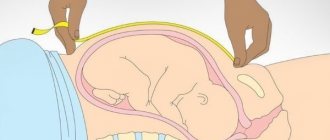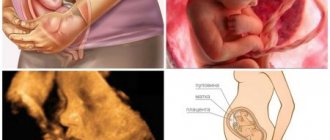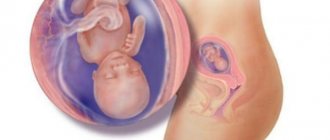What happens to a woman’s body and the developing fetus?
So, 18 weeks of pregnancy: what happens to the woman and the unborn child? As a rule, at this stage a woman begins to clearly feel the movements of her baby. If you are 18 weeks pregnant and there is no movement, then this is not a serious cause for concern, especially if this is your first pregnancy. In fact, the unborn child begins to move from the moment the heart starts, which does not stop beating until the very end of its life. It’s just that the little man is still so small that the expectant mother cannot hear his movements. Nevertheless, at the next appointment with a gynecologist, the first thing a pregnant woman should say is: “I’m 18 weeks pregnant, I don’t feel any movements.”
What should a mother do at 18 weeks?
Now, as always, the main thing is proper nutrition. It is necessary not only for the proper development of the child, but also for the normal well-being of the mother, since throughout pregnancy women face various problems of the digestive system.
For breakfast you need to eat heavily. Don't forget about grains and grains. You can eat a sweet bun or something tasty. For lunch it is recommended to eat soups, preferably chicken or fish. You can have cottage cheese and fruit for dinner; it is better not to overeat before bed. In between main meals, it is recommended to snack on fresh salads, fruits, nuts, and dried fruits. For drinks, preference should be given to fruit drinks and juices.
If you really want to, you can drink a cup of coffee with milk or strong tea. Occasionally you can treat yourself to fast food, but you should not include it in your daily menu. Healthy, vitamin-rich foods are preferred.
By this time, a woman’s weight increases by 3-5 kg. The belly is already clearly visible, and it’s time to buy beautiful blouses and dresses in the babydoll style.
General condition of the woman and child
The second trimester of pregnancy is the most favorable period for both the baby and the mother. 18 weeks of pregnancy - what happens during this time? As a rule, morning toxicosis and ailments are a thing of the past, the woman feels excellent, her mood has already leveled out, her tummy is not yet very large, but is already noticeable to others.
The length of the fruit reaches more than 14 cm, weight - about 200 g or even more. There is enough space for him in the uterus, the baby moves in different directions, actively turns over, and kicks. Such movements during ultrasound examination can even interfere with gender identification.
When does the baby start to move?
Starting from 8-9 weeks, the fetus is already moving in the amniotic fluid. But so far the woman does not feel these movements. Why is this happening? The answer is simple. The baby's movements are not felt by the mother, since the size of the fetus is still too small. An ultrasound examination can show how the baby touches the walls of the uterus with its limbs. At what week does the baby move so that a woman can feel it? As a rule, a woman can detect the first movements at 20 weeks of pregnancy. But it happens that this happens earlier or later by 3-4 weeks. The norm for feeling the baby’s movements is the time period from 16 to 24 weeks.
The period at which a woman begins to feel the baby’s movements may depend on several factors:
- The baby's weight and position in the womb. The movements of a large child are felt by the mother earlier than if the child had a small body weight.
- The subcutaneous fat layer of a pregnant woman, and in particular its thickness. Overweight mothers feel fetal movements later than slender ones.
- Sensitivity of nerve endings. The sensitivity threshold is different for every woman. It happens that some women feel those same tremors at 8-9 weeks. But such high sensitivity is rare.
- Active bowel function, which can be confused with the baby's movements.
- During the first pregnancy, movements are noticed 2-3 weeks later than when the child began to move earlier in the second and subsequent pregnancies.
Fetal development
Fetal development, 18th week of pregnancy - at this time the following events occur:
- the immune system is no longer so helpless, it produces substances that can fight viruses and infections;
- the baby has grown, its length can reach 20 cm, weight - from 150 to 250 g;
- adipose tissue appears, the skeletal system is strengthened, there are sprouts of molars;
- a child at the 18th week of pregnancy may for the first time clearly communicate to the expectant mother about his existence in the form of movements;
— unique fingerprints have been formed, hands can grab each other;
- the genitals have developed, you can determine the sex of the baby;
— the heart has formed, motor activity has increased;
- the eyes can distinguish between light and dark;
- and, the most interesting thing, your baby is already able to hear his mother’s voice; you can start singing to him and telling him bedtime stories.
Mom's feelings
If you are healthy and your weight is normal, you probably feel amazing. The belly has not yet grown enough to slow down the gait completely. True, there may be some unpleasant moments:
- heartburn - due to weakening of the muscle between the stomach and esophagus;
- pigment spots on the face (hormones are acting up);
- constipation and frequent urination (the growing uterus puts pressure on the intestines and bladder);
- difficulty falling asleep (almost any position seems uncomfortable);
- frequent increases in blood pressure;
- slight blurred vision;
- feeling as if the navel ache from the inside.
Some unpleasant sensations can be weakened or eliminated (read the recommendations below), some you just need to endure.
What do bellies look like at eighteen weeks? It's different for everyone. Some mothers feel like they’ve swallowed a ball, while others feel like their bellies are stretched from top to bottom. It's all right. Sometimes they even try to guess by the shape of the belly whether a girl or a boy will be born. And yet, only an ultrasound specialist can tell you for sure if you are prescribed such a study this week and the child wants to share a secret.
Photos of bellies
Photo ultrasound
Discharge, pain, complications
- Your breasts are preparing to feed your baby in a few months and therefore produce colostrum. Do not express it, as this may trigger uterine contractions.
- Your vaginal discharge may now noticeably increase. This is the norm, as long as the mucus is white and without an unpleasant odor. Brown, bloody, yellow discharge indicates various problems.
- When you feel a slight tug in your stomach or a ache in your lower back, know that everything is normal. This is how the ligaments and muscles that support your uterus are stretched. But if something really hurts, visit or call a doctor.
- Frozen pregnancy and miscarriage are possible at any stage. In this case, various complications, disturbances in the woman’s well-being and health often occur. Be attentive to your feelings.
- Another complication, sometimes quite severe, is late toxicosis. Read about it and check it out for yourself here.
Visit your doctor on time
If you have not yet undergone your next scheduled examination, your doctor will prescribe several blood tests:
- to the level of hCG;
- on the content of alpha-fetoprotein in the blood;
- to free estriol.
These specific tests will indicate the absence/presence of many fetal malformations and are therefore very important.
If your test results are abnormal, don't be alarmed. One “bad” analysis does not mean anything. You may have prepared incorrectly; mistakes are possible in the laboratory. Even an incorrectly set gestational age can give results that do not correspond to standard indicators. In any case, a study that is unsatisfactory in terms of its indicators must be repeated to eliminate all possible errors.
Let's exercise!
The 18th week is the best time for special gymnastics. It is also called Kegel exercises. To get the point across, go to the toilet and, while urinating, tense your muscles until it stops. This is the main exercise. Do them right:
- Empty your bladder first;
- don't hold your breath;
- Take a comfortable position.
The last recommendation is relative - during the exercises you can stand, sit or lie down, choose what is more convenient. This specific gymnastics strengthens the muscles of the pelvic floor, vagina and urethra.
Watch the video:
We train the muscles of the perineum. Kundalini Yoga Recommendation: Use Kegel exercises every time you urinate 8 times. The Bradley Method natural childbirth class's recommendation is 100 to 200 Kegel exercises per day. How to make it a habit? At any time when you are waiting for something (a line at a ticket office, on the subway, a red light on the road, making a phone call) practice Kegel exercises
Lifestyle and diet of a pregnant woman
Proper nutrition, spending time in the fresh air, and doing gymnastics for pregnant women are all integral components of a healthy lifestyle. A woman's diet should be balanced. For the proper development of the baby, replenishing the growing body’s need for calcium and preventing osteoporosis in women, it is necessary to add milk, cottage cheese, and fermented milk products to the diet, otherwise the baby will take calcium from the mother’s reserves (usually teeth). Additionally, you should not use chemicals containing this element; everything should be in moderation. Products that contain complete proteins, meat and fish are a must in the diet! To prevent constipation, you need to consume as much fiber as possible, found in fresh vegetables and fruits. A woman can receive vitamins both from natural products and from complexes for pregnant women prescribed to her by a gynecologist.
Other recommendations
- Maintain your previous diet.
- If you have heartburn, be sure to prepare porridge and jelly.
- A few prunes a day will relieve you of constipation.
- Don't overeat.
- If you have a headache, try lying in the dark and quiet. Usually this advice is given for migraines, but headaches in pregnant women go away faster in such an environment.
- Don’t be sad or upset - all unfavorable hormones will reach your baby through your blood and disturb him. If an unpleasant incident occurs in your life, urgently come up with something. Chat with family and friends, watch your favorite positive films, chat on forums for expectant mothers.
- If colostrum leaks, use special bra pads.
- Wear a prenatal bandage - it will support your growing belly and reduce lower back pain.
- Do you want to go to the toilet? If possible, do not be patient.
- Sex life can be truly amazing and a lot of fun. Possible prohibitions: oligohydramnios, threat of miscarriage, pregnancy with twins or even triplets, leakage of amniotic fluid and low placenta.
- Walk as much as possible, but do not do tiring, long walks.
- In addition to special gymnastics, do yoga for pregnant women and/or swim. Going to the pool will eventually help your baby find the correct position in the uterus.
- Talk to your child and teach the future dad this.
- Attend courses for pregnant women, communicate and gain useful experience.
- Beware of colds and any hypothermia. If there is an infectious epidemic in your city, do not hesitate to wear a medical mask in public places.
Think positive, take care of yourself, and the eighteenth week will be great.
What dangers await you during this period?
All stages of gestation may have their own dangers. The week in question is no exception to the rule. The danger of miscarriage does not leave the pregnant woman even now. The risk of its occurrence becomes higher due to existing chronic or acquired diseases of the expectant mother. The threat of spontaneous abortion as a result of uncontrolled use of medications cannot be ruled out. The greatest danger is a reddish discharge from the genital tract, in which case you should consult a doctor immediately! Monitor your intestinal health.
Listen carefully to your feelings and the baby’s movements, especially when you are 18 weeks pregnant. There is no movement of the baby, although before this you clearly felt its weak tremors? Lie down, relax, put your hand on your stomach and listen. If nothing happens, change your body position and move a little. Perhaps the baby is just sleeping, and if the baby was active before, then silence for a long time should be alarming. In this case, to exclude the possibility of a frozen pregnancy, consult your doctor.
Frequently asked questions on the forums
Q: Second pregnancy, 18 weeks, why don’t I feel any movement?
A: As a rule, with the second pregnancy, movements begin to be felt earlier than with the first. However, this does not happen for everyone. You can feel the first tremors, just like in your first pregnancy, only by 20-22 weeks. If the feeling of anxiety does not leave you, it is better to consult a doctor so that he can confirm that the size of the uterus corresponds to the period of pregnancy and listen to the fetal heartbeat. It is also important to understand that excess weight can interfere with feeling early movements.
Q: 18th week of pregnancy, movements - what are they? How can you understand that these are the baby’s movements and not something else?
A: Fetal movements at this stage are still barely noticeable. They do not feel like strong shocks, but rather feel like light movements inside. Some compare them to bubbles, others to the movement of fish fins or butterfly wings. At this stage they are still weak and tender. The appearance of such sensations during loud, sharp sounds or when stroking the abdomen indicates that it is the child who responds to external stimuli.
Q: Why shouldn’t pregnant women sleep on their backs?
A: As the uterus grows and gains weight in the supine position, it begins to put pressure on the vena cava, which runs along the spine and is responsible for the blood supply to the legs. Clamping this vein for a long time can lead to oxygen starvation of the child, which will negatively affect his development. Regular compression of the vena cava, for example, while sleeping on the back, can cause poor health in the mother and the development of defects in the child.










